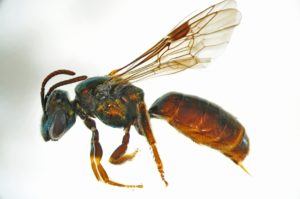
Native Fijian bees’ love for pollen from introduced species could be a major threat to the Pacific island’s ecosystems, according to research by students from Flinders University and the University of South Australia.
The unexpected finding came during an intensive mini-research project to assess the biodiversity of unfamiliar ecosystems and how to recognize threats, especially from exotic pests.
Flinders University’s Associate Professor Michael Schwarz said the effectiveness of Fijian bees in pollinating introduced weeds was allowing them to spread at an alarming rate, making Fiji especially vulnerable to exotic plan species.
“The students obtained some very important data and will write this up for several journal publications,” he said.
“They also examined the social behaviour of one bee species from the USP campus and found unexpected complexity in how females interact with each other.
“These findings shed light on areas like kin recognition, and food sharing that dates back to the Eocene, at least 45 million years ago.”
The students, funded by the Australian Government’s New Colombo Plan, looked at a wide range biodiversity issues in lowland rainforest and highland dry forest areas.
The project aims to improve capacity building for biodiversity and environmental risk assessment, and to provide training for jobs to safeguard ecosystems.
It’s hoped that it will also provide students, who are immersed in local culture during their trip, with long-lasting contacts with staff and students from the region.
Associate Professor Mark Stevens, from the South Australian Museum, who led four students into the remote highlands of Viti Levu, said it had provided them with a snapshot of how research programs operate in remote and culturally diverse regions.
“For these four students, it was a crash-course in remote fieldwork,” he said.
“Across 10 days they were exposed to the limitations of a cyclone affected region now with no electricity and minimal access, a potential looming cyclone that brought two days of rain, and trekking on foot up mountain forests for five of the 10 days.
“All this while still focusing on collecting for their research projects which aimed at examining pollination networks of native insects, particularly native bees.”
Despite the disruption caused by the cyclone and its effects, the students described their trip to Fiji as a once in a lifetime experience.
The funding provided to students as part of the Government’s New Colombo Plan will see around 190 Flinders University and University of South Australia students take part in mobility projects across the Indo-Pacific throughout 2016.
Numbers of Flinders and UniSA students travelling to Fiji for biodiversity and biosecurity mini-projects will increase over 2017 and 2018.
For more information follow this link.

